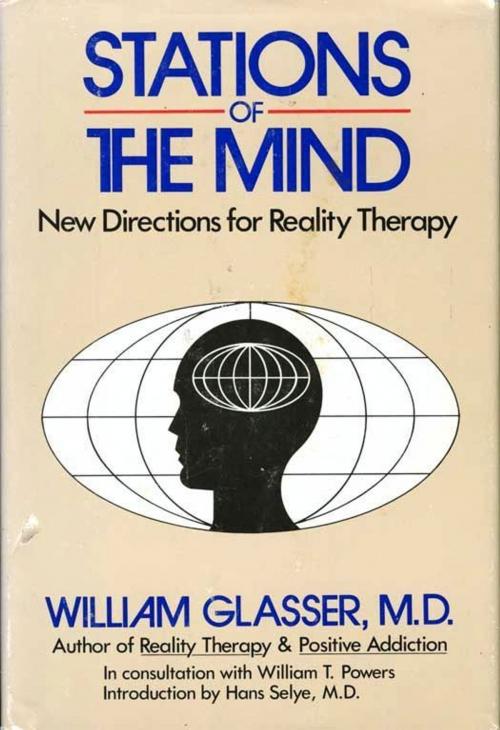| Author: | William Glasser M.D. | ISBN: | 9780062048141 |
| Publisher: | HarperCollins e-books | Publication: | December 14, 2010 |
| Imprint: | HarperCollins e-books | Language: | English |
| Author: | William Glasser M.D. |
| ISBN: | 9780062048141 |
| Publisher: | HarperCollins e-books |
| Publication: | December 14, 2010 |
| Imprint: | HarperCollins e-books |
| Language: | English |
Stations of the Mind is a logical and necessary expansion of William Glasser's basic Reality Therapy ideas, an expansion which began with Positive Addiction about meditation, running, and other "good" addictions. In clear, nontechnical language, this book tells how our brains function in living—specifically what we do, think, and feel. Any reader can use it to make a major impact on the social sciences, medicine, and the growing field of meditation.
Dr. Glasser's thesis, based on the Control System Psychology of William Powers, a student of cybernetics and consultant on this book, is that we, like all living creatures, are internally motivated. All of us are driven by powerful internal forces that push us not only to survive, but toward belonging, worthwhileness, fun, and freedom. From these and perhaps our other basic needs, we construct a complex, unique a personal world. Our brain then acts as the control system that deals with the real world to try and control it so that it comes as close as possible to our personal world.
Glasser points out that what happens outside us in the real world is of little or no significance unless it relates to what is already inside us in our personal world.
This new, human, internally motivated psychology contrasts sharply with the standard, external, mechanical, stimulus-response behavior psychology currently so popular. Glasser strips away much of the mystery that has surrounded the workings of our mind. Those who read the book carefully need never again be puzzled as to how we behave or about many of the whys of our behavior. It explains the common psychological upsets—from acting out to depression, from nonmedical pain and disability to psychoses.
Dr. Glasser sets forth a new usable explanation of how addictive drugs work in the brain and why we use them. He also explains how our brain malfunctions and causes us to suffer psychosomatic illnesses.
Finally, as we understand how our brain struggles to fulfill our needs, we will gain valuable insight into our most pressing social problem—how to get along with each other; that must come through negotiation and compromise. Our brain is not built to do otherwise.
Here is a carefully developed thesis, a clear explanation of complex ideas, and a wide variety of ways that we can use them in our lives and our work.
Stations of the Mind is a logical and necessary expansion of William Glasser's basic Reality Therapy ideas, an expansion which began with Positive Addiction about meditation, running, and other "good" addictions. In clear, nontechnical language, this book tells how our brains function in living—specifically what we do, think, and feel. Any reader can use it to make a major impact on the social sciences, medicine, and the growing field of meditation.
Dr. Glasser's thesis, based on the Control System Psychology of William Powers, a student of cybernetics and consultant on this book, is that we, like all living creatures, are internally motivated. All of us are driven by powerful internal forces that push us not only to survive, but toward belonging, worthwhileness, fun, and freedom. From these and perhaps our other basic needs, we construct a complex, unique a personal world. Our brain then acts as the control system that deals with the real world to try and control it so that it comes as close as possible to our personal world.
Glasser points out that what happens outside us in the real world is of little or no significance unless it relates to what is already inside us in our personal world.
This new, human, internally motivated psychology contrasts sharply with the standard, external, mechanical, stimulus-response behavior psychology currently so popular. Glasser strips away much of the mystery that has surrounded the workings of our mind. Those who read the book carefully need never again be puzzled as to how we behave or about many of the whys of our behavior. It explains the common psychological upsets—from acting out to depression, from nonmedical pain and disability to psychoses.
Dr. Glasser sets forth a new usable explanation of how addictive drugs work in the brain and why we use them. He also explains how our brain malfunctions and causes us to suffer psychosomatic illnesses.
Finally, as we understand how our brain struggles to fulfill our needs, we will gain valuable insight into our most pressing social problem—how to get along with each other; that must come through negotiation and compromise. Our brain is not built to do otherwise.
Here is a carefully developed thesis, a clear explanation of complex ideas, and a wide variety of ways that we can use them in our lives and our work.















